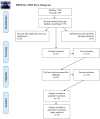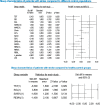Polysomnographic Characteristics of Sleep in Stroke: A Systematic Review and Meta-Analysis
- PMID: 26949966
- PMCID: PMC4780740
- DOI: 10.1371/journal.pone.0148496
Polysomnographic Characteristics of Sleep in Stroke: A Systematic Review and Meta-Analysis
Erratum in
-
Correction: Polysomnographic Characteristics of Sleep in Stroke: A Systematic Review and Meta-Analysis.PLoS One. 2016 May 11;11(5):e0155652. doi: 10.1371/journal.pone.0155652. eCollection 2016. PLoS One. 2016. PMID: 27167622 Free PMC article.
Abstract
Background: Research on sleep after stroke has focused mainly on sleep disordered breathing. However, the extend to which sleep physiology is altered in stroke survivors, how these alterations compare to healthy volunteers, and how sleep changes might affect recovery as well as physical and mental health has yet to be fully researched. Motivated by the view that a deeper understanding of sleep in stroke is needed to account for its role in health and well-being as well as its relevance for recovery and rehabilitation, we conducted a systematic review and meta-analysis of polysomnographic studies comparing stroke to control populations.
Method: Medline and PsycInfo databases were searched using "stroke" and words capturing polysomnographic parameters as search terms. This yielded 1692 abstracts for screening, with 15 meeting the criteria for systematic review and 9 for meta-analysis. Prisma best practice guidelines were followed for the systematic review; the Comprehensive Meta-Analysis software was used for random effects modelling.
Results: The meta-analysis revealed that patients with stroke have poorer sleep than controls. Patients had lower sleep efficiency (mean 75% vs 84%), shorter total-sleep-time (309.4 vs 340.3 min) and more wake-after-sleep-onset (97.2 vs 53.8 min). Patients also spend more time in stage 1 (13% vs 10%) and less time in stage 2 sleep (36% vs 45%) and slow-wave-sleep (10% vs 12%). No group differences were identified for REM sleep. The systematic review revealed a strong bias towards studies in the early recovery phase of stroke, with no study reporting specifically on patients in the chronic state. Moreover, participants in the control groups included community samples as well as other patients groups.
Conclusions: These results indicate poorer sleep in patients with stroke than controls. While strongly suggestive in nature, the evidence base is limited and methodologically diverse, and hands a clear mandate for further research. A particular need regards polysomnographic studies in chronic community-dwelling patients compared to age-matched individuals.
Conflict of interest statement
Figures



References
-
- Dworzynski K, Ritchie G, Fenu E, MacDermott K, Playford ED. Rehabilitation after stroke: summary of NICE guidance. BMJ [Internet]. 2013. January [cited 2015 Jul 12];346:f3615 Available: http://www.ncbi.nlm.nih.gov/pubmed/23760965. 10.1136/bmj.f3615 - DOI - PubMed
-
- Palagini L, Rosenlicht N. Sleep, dreaming, and mental health: a review of historical and neurobiological perspectives. Sleep Med Rev [Internet]. 2011. June [cited 2015 May 30];15(3):179–86. Available: http://www.ncbi.nlm.nih.gov/pubmed/20850358. 10.1016/j.smrv.2010.07.003 - DOI - PubMed
-
- Reid KJ, Martinovich Z, Finkel S, Statsinger J, Golden R, Harter K, et al. Sleep: a marker of physical and mental health in the elderly. Am J Geriatr Psychiatry [Internet]. 2006. October [cited 2015 Jun 4];14(10):860–6. Available: http://www.ncbi.nlm.nih.gov/pubmed/17001025. - PubMed
-
- Smagula SF, Reynolds CF, Ancoli-Israel S, Barrett-Connor E, Dam T-T, Hughes-Austin JM, et al. Sleep Architecture and Mental Health Among Community-Dwelling Older Men. J Gerontol B Psychol Sci Soc Sci [Internet]. 2013. December 10 [cited 2015 Jul 10]; Available: http://www.ncbi.nlm.nih.gov/pubmed/24326077. - PMC - PubMed
-
- Gruber R, Cassoff J. The interplay between sleep and emotion regulation: conceptual framework empirical evidence and future directions. Curr Psychiatry Rep [Internet]. 2014. November [cited 2015 Jul 10];16(11):500 Available: http://www.ncbi.nlm.nih.gov/pubmed/25200984. 10.1007/s11920-014-0500-x - DOI - PubMed
Publication types
MeSH terms
LinkOut - more resources
Full Text Sources
Other Literature Sources
Medical

